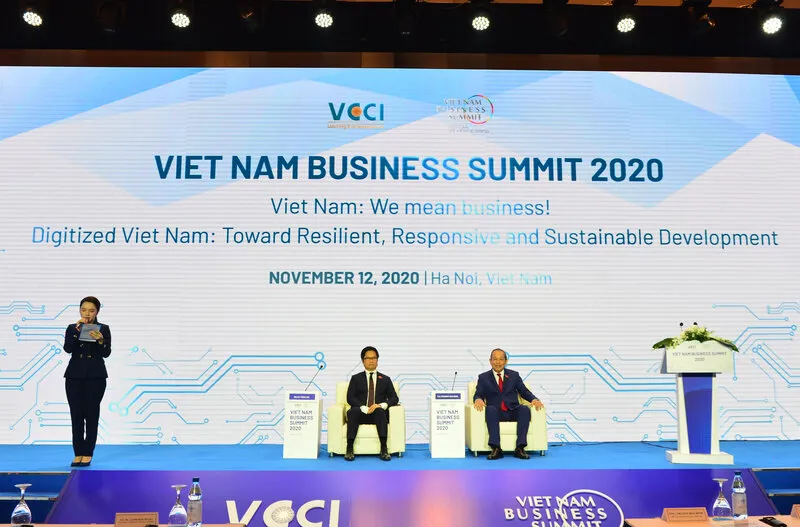Vietnam’s 4 commitments towards inclusive and sustainable development
Vietnam’s growth model has gradually shifted from an economy that is highly dependent on natural resources and cheap labor for grow towards the application of technology, science and innovation.
Deputy Prime Minister Truong Hoa Binh at the Vietnam Business Summit held on November 12 outlined the government’s four commitments to ensure the country’s inclusive and sustainable development.
Deputy Prime Minister Truong Hoa Binh at the VSB 2020. Photo: Nhat Son. |
Firstly, the Vietnamese government would strive to become a facilitating government that puts the business community and people at its core of services; create a favorable business environment and reform administrative procedures to remove bottlenecks to development; promote startups and innovation to help local enterprises further integrate into global value chains.
Secondly, accelerating the development of digital economy and society. The government is set to focus on developing digital infrastructure, training high quality human resources, so that the contribution of digital economy would reach 20% of GDP by 2025.
Thirdly, prioritizing investment in strategic infrastructure projects in terms of quality, quantity and consistency, as well as basic infrastructure systems in rural and highland areas to ensure a green and sustainable economic development.
Fourthly, improving quality in educational training, especially at universities and highly skilled labor forces to aid the development of a modernized economy.
Overview of the VBS 2020. Photo: Nhat Son. |
Countries with advantages of Industry 4.0 to stay ahead of others
According to Mr. Binh, the Vietnamese government is committed to accompanying the business community and people, aiming to take the advantage of the Industry 4.0 and global integration process to realize the country’s goal of prosperity.
While the Covid-19 pandemic is leading the world into one of its most severe economic crises since the Great Depression in 1929 – 1933, the digital economy has emerged as an inevitable trend and transformed all economic sectors, added Mr. Binh.
Additionally, the digital economy has created new resources in terms of digital data and assets for development, changed human behavior and opened new opportunities for countries that are in front of the Industry 4.0 race to move ahead others.
During this context, the Vietnamese government prioritizes the dual target of both containing the pandemic and boosting economic recovery.
Mr. Binh pointed out that Vietnam remains a spotlight of the world economy with a positive economic growth of 2.12% in the first nine months of 2020, and is on track to reach 2.5 – 3% for this year.
Despite disrupted global trade activities as a result of Covid-19, Vietnam posted a record-high trade surplus of nearly US$19 billion in the first 10 months this year, while the country’s Global Innovation Index (GII) in 2020 reached 42nd out of 131 countries and territories, and at the top of group of countries with similar income level.
According to Mr. Binh, Vietnam’s growth model has gradually shifted from an economy that is highly dependent on natural resources, exports of raw products, cheap labor, and credit expansion, among others, for grow towards the application of technology, science and innovation.
On top of these factors, the business environment has been constantly improved along with the administrative reform process, which help nurture a large business community, asserted Mr. Binh.
Given its strategic geographic location in the Asia – Pacific and a large domestic market of over 100 million people, Vietnam has become a major hub of production for multinationals.
Vietnam’s efforts in global economic integration process as a member of 13 free trade agreements have also been a positive factor to attract foreign investors, Mr. Binh stated.

.jpg)











